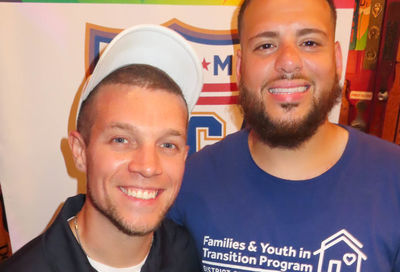FDA study could lead to end of restrictions on gay and bisexual blood donors
Study hopes to asses whether individualized risk assessments would be just as effective as categorical bans

The U.S. Food and Drug Administration is sharing new details on a study that could lead to the removal of long-standing restrictions on gay or bisexual men donating blood and plasma.
The study, known as ADVANCE: Assessing Donor Variability And New Concepts in Eligibility, calls for collaboration between three of the nation’s largest blood centers: Vitalant, OneBlood, and the American Red Cross, alogn with LGBTQ community centers nationwide.
The goal of the study, which the FDA hopes to present for review by late 2021, is to determine whether donor deferral can be based on an individual risk assessment, rather than the current blanket rules.
Currently, gay and bisexual men in the United States must abstain from sex from three months before becoming eligible to donate blood or plasma. The restriction applies even for gay and bisexual men who are in monogamous relationships, test negative for HIV, and engage in safe sex practices.
That deferral period was reduced by nine months beginning in April, in response to the COVID-19 pandemic and concerns that gay or bisexual survivors would not be able to donate antibody-rich plasma crucial to providing treatment for those suffering from the virus.
Prior to the now-defunct 12-month deferral period introduced in 2015 under the Obama administration, there was a categorical ban on any man who had engaged in sex with another man since 1977.
That restriction was introduced in 1983 in response to the HIV/AIDS crisis and the inability of technology to screen blood for the virus. Advances in screening have since rendered a lifetime ban irrelevant.
“The FDA remains committed to considering alternatives to time-based deferral by generating the scientific evidence that is intended to support an individual risk assessment-based blood donor questionnaire,” an FDA spokesperson told ABC News.
The ADVANCE study will include 2,000 men, ages 18 to 30, who’ve had sex with men in the past three months and wish to become blood donors, in the hope of generating data that could help the FDA determine whether a screening process and donor questionnaire dealing with individual risk assessment would be preferable and as effective as blanket time-based deferrals.
Dr. Brian Custer, the vice president of research and scientific programs at Vitalant and the principal investigator for the overall study, who will oversee research at three of the eight planned study locations, told ABC News that developing an effective questionnaire is essential to the study.
“The donor history questionnaire consists of a series of questions that all potential blood donors answer before donating,” he said. “The questions we are evaluating in the ADVANCE Study are not identical to those the UK [National Health Service Blood and Transplant] has developed, but they are similar.”
Related: Andy Cohen and Yuval David call out FDA restrictions on gay and bi male blood donors
The United Kingdom announced last week that it would ease restrictions on gay and bisexual male donors, focusing on individualized risk-based assessments rather than categorical bans while still preserving the safety of blood that is donated — something Health and Social Care Secretary Matt Hancock hailed as a “landmark change.”
Other countries, including Italy, Argentina, Russia, South Africa, Spain, and Hungary, have all scuttled categorical bans on gay and bisexual men, instead focusing on individual risk assessments.
America’s Blood Centers, which claim to provide 60% of the nation’s blood supply, told ABC News in a statement that the group “supports the deferral criteria change and continues to encourage ongoing work to establish donor-screening based on individual behaviors, not sexual or gender identity.”
The LGBTQ advocacy organization GLAAD, which has been one of the louder voices advocating for such a change, echoed previous statements it made calling the current restrictions “discriminatory.”
“As the FDA continues to reconsider its blood donation policies here in the United States, the decision in the United Kingdom offers further proof that U.S. blood donation policies for gay and bisexual men, and other LGBTQ people, are outdated, out of line with science, and must change to be based on individual assessments rather than discriminatory blanket bans,” Matthew Lasky, the group’s director of communications, said in a statement.
Yuval David, an actor and activist who has been vocal about the need for an end to categorical restrictions on gay and bi donors, said in a statement that the COVID-19 pandemic has revealed many social inequalities in need of repair.
“Gay and Bi men cannot give blood in an effort to help those in need and to find a treatment, unless they follow the celibacy requirement. No other group is discriminated against like this. There is not a similar requirement of women or heterosexual men,” David said. “I do not intend to divert focus from the pandemic and the greater concerns for protecting the health and safety of our population. Those concerns of course are paramount. But, just like this pandemic is revealing glaring differences in health treatment based on economic status, and even race, it is revealing glaring differences based on sexual orientation.”
Read more:
Federal judge blocks Trump order banning workplace diversity and sensitivity trainings
Trump appoints Richard Grenell to Holocaust Memorial Council
Gay couple says someone smeared feces on their Christmas lawn decorations
Support Metro Weekly’s Journalism
These are challenging times for news organizations. And yet it’s crucial we stay active and provide vital resources and information to both our local readers and the world. So won’t you please take a moment and consider supporting Metro Weekly with a membership? For as little as $5 a month, you can help ensure Metro Weekly magazine and MetroWeekly.com remain free, viable resources as we provide the best, most diverse, culturally-resonant LGBTQ coverage in both the D.C. region and around the world. Memberships come with exclusive perks and discounts, your own personal digital delivery of each week’s magazine (and an archive), access to our Member's Lounge when it launches this fall, and exclusive members-only items like Metro Weekly Membership Mugs and Tote Bags! Check out all our membership levels here and please join us today!























You must be logged in to post a comment.